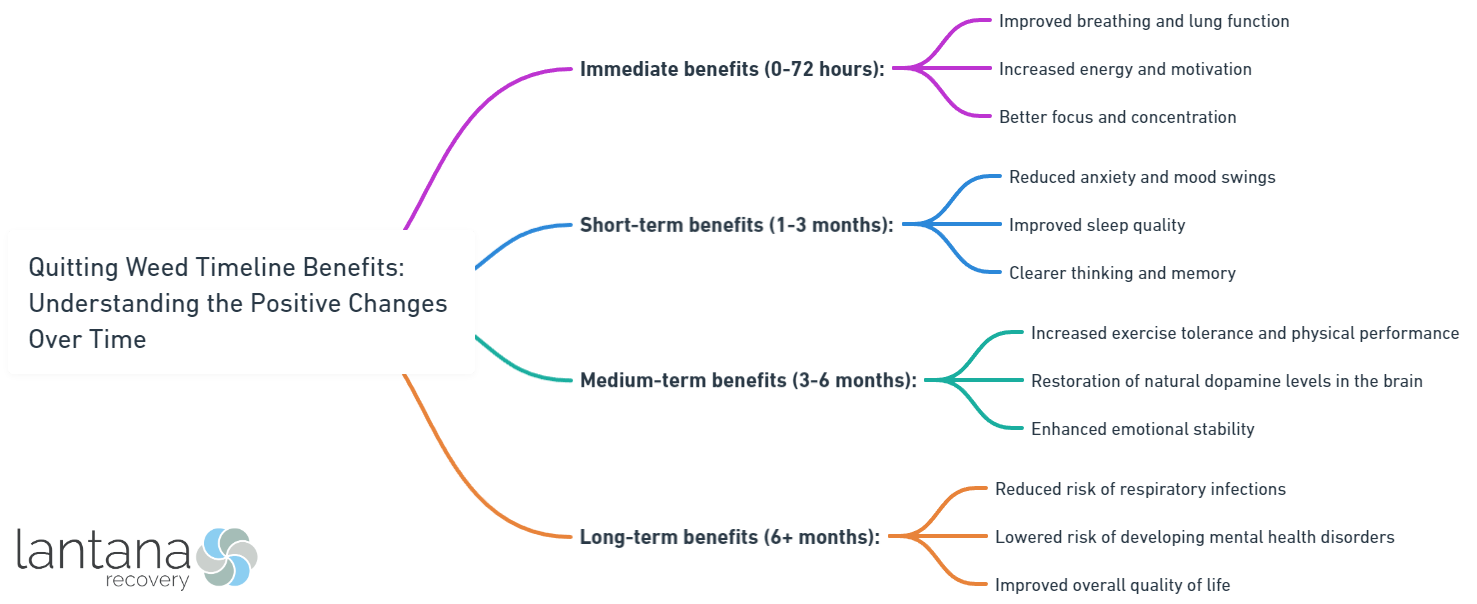Quitting weed, also known as marijuana, can have a significant impact on one’s physical and mental well-being. Understanding the positive changes that occur over time can serve as a motivating factor for those looking to quit. By referencing reputable sources such as the National Institute on Drug Abuse, we can explore the timeline benefits of quitting weed.
Quitting weed refers to the act of discontinuing the use of marijuana. This decision often arises from personal health and lifestyle considerations. While the process of quitting can vary from person to person, understanding the positive changes that come with quitting can provide a sense of hope and encouragement.
In the short term, quitting weed can lead to various immediate benefits:
-
When one stops smoking weed, the lungs begin to repair themselves, allowing for improved lung capacity and function.
-
Cannabis use can sometimes lead to feelings of fatigue and lethargy. Quitting weed can result in increased energy levels and improved overall vitality.
-
Marijuana use can impair memory, attention, and problem-solving skills. Quitting weed allows the brain to regain its ability to focus, concentrate, and think clearly.
-
Weed consumption can disrupt sleep patterns and reduce the quality of rest. By quitting, individuals often experience improved sleep, leading to greater daytime alertness and overall well-being.
Continuing with the process of quitting weed brings further benefits in the short term:
-
Quitting weed can enhance motivation and drive, allowing individuals to pursue personal and professional goals with renewed enthusiasm.
-
Marijuana use can sometimes lead to mood fluctuations and feelings of anxiety or depression. By quitting weed, individuals often experience more stabilized and positive moods.
-
Extended marijuana use can impact memory and cognitive function. By quitting, individuals may notice improvements in memory recall and cognitive performance.
-
Quitting weed can contribute to healthier relationships, as individuals may find it easier to communicate effectively, engage in social activities, and connect with loved ones.
Understanding both the short-term and long-term benefits of quitting weed can provide the necessary motivation and inspiration for individuals on their cessation journey. By highlighting the positive changes that occur over time, individuals can make informed decisions to improve their overall well-being.

Immediate Benefits of Quitting Weed
Ready to experience a positive shift after quitting weed? In this section, we’ll explore the immediate benefits that come with bidding farewell to this habit. From improved lung function to increased energy levels, enhanced cognitive function, and better quality of sleep, the positive changes you’ll notice after quitting weed are worth celebrating. So, let’s dive into the exciting transformations awaiting you as you embark on this journey of liberation.
Improved Lung Function
When you quit smoking weed, your lung function improves. Smoking marijuana involves inhaling smoke, which is harmful to the lungs. The smoke contains tar, leading to chronic bronchitis, coughing, and wheezing. By quitting weed, your lungs have a chance to heal and rebuild capacity.
Studies have shown that lung function begins to improve within a few weeks of quitting. Airways become less inflamed, allowing for better airflow and oxygen exchange. This reduces shortness of breath and increases energy for physical activities.
According to a study published in the European Respiratory Journal, “reducing or quitting cannabis use was associated with reductions in the prevalence of cough, sputum and wheeze to levels similar to nonusers.” (Effects of quitting cannabis on respiratory symptoms, Hancox et al., 2015)
Quitting weed also reduces the long-term risk of respiratory issues. Chronic marijuana use increases the chance of developing conditions like chronic obstructive pulmonary disease (COPD) and lung cancer. By quitting, you protect your lung health.
Pro tip: Incorporate regular exercise into your routine to further enhance lung function. Physical activity improves lung capacity and strengthens respiratory muscles. Consider activities like running, swimming, or cycling to boost overall lung health.
Remember, quitting weed not only improves lung function but also benefits overall well-being. Stay committed to your decision and enjoy the positive changes.
Increased Energy Levels
Increased energy levels result from quitting weed. When you stop using weed, positive changes occur in your body that significantly boost your energy. The following factors contribute to increased energy levels:
-
Improved sleep quality: Quitting weed can lead to better sleep, resulting in more restful nights and increased daytime energy.
-
Enhanced metabolism: Weed can slow down your metabolism. Once you quit, your metabolism functions more efficiently, providing you with more energy.
-
Increased oxygen intake: Smoking weed harms your lungs and reduces oxygen intake. Quitting smoking improves lung function, allowing for better oxygen intake and increased energy levels.
-
Improved focus and concentration: Weed impairs cognitive function, including focus and concentration. Quitting allows your brain to recover and function optimally, increasing energy for mental tasks.
-
Reduced fatigue: Weed can cause lethargy and fatigue. Quitting will likely result in reduced fatigue and increased energy throughout the day.
By quitting weed, you can enjoy increased energy levels that positively impact various aspects of your life. Having more energy allows you to pursue hobbies, engage in physical activities, and be more productive at work, ultimately improving your overall well-being.
Improved Cognitive Function
Improved cognitive function is a significant benefit of quitting weed. When you decide to stop using weed, positive changes occur in your brain that enhance your cognitive function. Here are several specific ways that quitting weed can improve your cognitive function:
1. Enhanced memory: Quitting weed has been shown to improve memory and the ability to recall information. Research has found that long-term marijuana use can have a negative impact on memory, but when you quit, there can be a significant improvement.
2. Increased focus and concentration: Marijuana use can impair concentration and focus. However, by quitting weed, you can enhance your attention and focus for extended periods.
3. Improved decision-making: The use of marijuana can affect judgment and decision-making. When you quit weed, your mind becomes clearer, leading to improved decision-making capabilities.
4. Boosted problem-solving skills: Quitting weed can enhance your problem-solving skills by allowing your brain to function more efficiently. Analyzing situations and finding effective solutions become easier.
5. Sharper cognitive processing: Marijuana use can slow down cognitive processing, making it more challenging to process information quickly. However, when you quit weed, your cognitive processing speed improves, enabling faster and more efficient thinking.
Quitting weed brings about significant improvements in cognitive function, including enhanced memory, increased focus, improved decision-making, sharper problem-solving skills, and faster cognitive processing. In a research study published in Journal of the International Neuropsychological Society where scientists were studying the impact of abstinence of weed on cognition in adolescent and young adults, participants displayed a significant improvement in cognition and memory recovery even after 2-weeks of abstinence. These improvements have a positive impact on various aspects of life, such as work, education, and overall mental well-being.
Better Quality of Sleep
Quitting weed can significantly enhance the better quality of your sleep. The absence of THC, the psychoactive compound found in weed, can disrupt sleep cycles and hinder the ability to achieve deep, restorative sleep. Without marijuana, you may experience fewer disturbances at night, leading to a more restful and rejuvenating sleep experience.
Furthermore, giving up weed can also help regulate your sleep schedule. The use of marijuana can throw off your natural sleep-wake cycles, making it difficult to establish consistent patterns of sleep. However, when you quit, your body will be able to regulate its sleep patterns, resulting in a more structured and consistent sleep routine.
Optimizing the quality of your sleep has profound positive impacts on overall well-being. Adequate and high-quality sleep is indispensable for maintaining optimal physical and mental health. When you consistently obtain a good night’s sleep, you awaken feeling refreshed, energized, and more focused throughout the day.

Short-term Benefits of Quitting Weed
Looking to reap the short-term benefits of quitting weed? Get ready for an inspiring journey filled with increased motivation, enhanced mood, improved memory and concentration, and enriched relationships. Experience a boost in productivity, a brighter outlook on life, and better connections with those around you. From regaining focus to enhancing your overall well-being, discover the positive changes that await when you take the first step towards a weed-free lifestyle. Say goodbye to the haze, and step into a world of newfound possibilities.
Increased Motivation
Increased Motivation is a short-term benefit of quitting weed. Here are some ways it can boost your motivation:
-
Clearer Mind: Quitting weed clears your mind of its foggy effects. With a clear mind, you can better focus on your goals and tasks, increasing your motivation to achieve them.
-
Improved Energy Levels: Weed can make you feel lethargic and unmotivated. When you quit, your energy levels naturally rise, giving you motivation to be more active and engaged in your daily activities.
-
Enhanced Goal-Oriented Thinking: Weed can hinder your ability to think long-term and set goals. Quitting allows you to regain clarity and perspective, enabling you to set and pursue meaningful goals, which increases your motivation to work towards achieving them.
-
Increased Drive and Determination: Quitting weed often increases your overall drive and determination. You may find yourself more willing to take on challenges and push yourself to achieve higher levels of success.
Pro-tip: Along with quitting weed, it’s important to cultivate healthy habits, such as exercise, proper sleep, and setting realistic goals, to sustain and enhance your motivation levels over time.
Enhanced Mood
Quitting weed has been found to enhance mood by reducing anxiety and depression. Numerous studies have indicated that marijuana use can have detrimental effects on mental health, which makes quitting all the more crucial. By giving up weed, individuals often experience a notable improvement in their emotional state, leading to increased happiness and positivity. This, in turn, contributes to an overall enhancement of well-being.
Furthermore, quitting weed can have a positive impact on relationships and social interactions. With newfound energy and motivation, individuals are more inclined to engage with others, thus strengthening their connections. Emotional stability is another benefit that quitting weed brings, as it helps reduce mood swings and instability.
The personal account of one individual who quit weed further supports these findings, as they reported a significant enhancement in their mood, resulting in a happier and more stable emotional state. Ultimately, quitting weed not only has the potential to enhance mood, but also allows individuals to cultivate healthier relationships and well-being.
If you are looking forward to quitting weed smoking, read our complete pdf guide for quitting weed where discuss the science, treatment, strategies, and benefits of stopping weed smoking.
Improved Memory and Concentration
Improved Memory and Concentration are benefits of quitting weed. When individuals stop using marijuana, they may experience improvements in their cognitive abilities. Chronic marijuana use can impair memory and concentration, making it difficult to focus and retain information. However, quitting weed allows the brain to recover and function more efficiently.
Quitting weed enhances memory by improving the encoding and retrieval processes. Marijuana can disrupt the formation of new memories and interfere with the retrieval of existing memories. When individuals quit using weed, their ability to encode and retrieve information becomes more effective, leading to improved memory.
Quitting weed also improves concentration. Marijuana use can decrease attention span and make it difficult to concentrate on tasks. However, by quitting weed, individuals can regain their ability to concentrate for longer periods and maintain focus on important activities.
It is important to note that the extent of memory and concentration improvement may vary among individuals and depend on factors such as the duration and intensity of marijuana use. However, quitting weed is generally associated with positive changes in cognitive function.
For those looking to enhance their memory and concentration, quitting weed is a significant step towards achieving that goal. By abstaining from marijuana use, individuals can cultivate a sharper mind and improve their overall cognitive abilities.
Remember, everyone’s journey is unique, and it is advisable to consult a healthcare professional for personalized advice and support when quitting weed.
Enhanced Relationships
Enhanced relationships are a benefit of quitting weed. When you stop using weed, you may experience positive changes in your interactions with others. Here are some ways quitting weed can enhance relationships:
-
Improved communication: Quitting weed improves communication skills, allowing for better understanding with loved ones.
-
Increased empathy: Quitting weed helps regain the ability to empathize with others.
-
Enhanced trust: Quitting weed shows commitment to change and helps rebuild trust.
-
Deeper connections: Quitting weed allows more time and energy to nurture relationships, resulting in deeper connections.
Quitting weed alone may not solve all relationship issues. Open communication and willingness to work on yourself and your relationships are essential for long-lasting positive changes. By quitting weed, you can create a foundation for healthier relationships.

Medium-term Benefits of Quitting Weed
Experience the positive changes that come with quitting weed in the medium-term. Discover how your physical fitness, financial savings, productivity, and creativity are all enhanced when you choose to leave weed behind. Say goodbye to the haze and embrace a new, healthier lifestyle filled with countless benefits. Get ready to unlock your true potential and thrive in all aspects of your life.
Improved Physical Fitness
Quitting weed can have a positive impact on physical fitness. Here are several ways in which quitting weed can contribute to improved physical fitness:
- Increased lung capacity: By quitting weed, you can enhance lung function, allowing for better oxygen intake during physical activities.
- Enhanced cardiovascular health: Ceasing weed consumption reduces the risk of heart issues, such as high blood pressure and heart disease, leading to better cardiovascular fitness.
- Better endurance: Without the hinderance of weed on energy levels, engaging in prolonged physical activities and improving endurance becomes easier.
- Stronger muscles: Quitting weed boosts the ability to build and maintain muscle mass, which is particularly advantageous for strength-based exercises.
- Improved flexibility: Some studies suggest that quitting weed may contribute to increased flexibility, resulting in better performance in activities like yoga or dance.
Quitting weed can be a significant step towards achieving improved physical fitness. It is important to note that individual results may vary, and factors such as diet and exercise also play a crucial role in reaching optimal physical fitness. To obtain personalized guidance on how quitting weed can complement your fitness goals, it is recommended to consult with a healthcare professional or fitness expert.
Financial Savings
Quitting weed can lead to significant financial savings. When individuals eliminate the purchase of marijuana, they can save a considerable amount of money over time. This results in reduced expenses as the funds that would have been used on buying weed can be redirected towards more important areas such as paying off debt, saving for the future, or investing in personal growth. To visualize the potential long-term savings, it is advisable to calculate the monthly or annual expenses previously allocated to weed.
The financial savings obtained from quitting contribute to reduced stress, increased stability, and the achievement of long-term goals. For better progress tracking and to truly appreciate the benefits of quitting weed, it is recommended to set up a separate savings account specifically for depositing the money that would have been spent on marijuana.
Improved Productivity
Improved productivity is a significant benefit of quitting weed. When you stop using weed, you may experience increased focus, concentration, and efficiency in your daily tasks. Here are some ways quitting weed can improve your productivity:
- Clearer Mind: Quitting weed allows your mind to function fully, without the drug’s foggy effects. This clarity enables you to think more clearly, make better decisions, and stay focused on your goals.
- Enhanced Energy Levels: Weed can leave you unmotivated or lethargic, hindering your productivity. However, quitting can increase your energy levels, making it easier to tackle tasks and stay productive throughout the day.
- Improved Time Management: Weed can lead to procrastination and a lack of time management skills. By quitting, you can cultivate better time management habits, prioritize tasks effectively, and utilize your time efficiently.
- Better Work-Life Balance: Quitting weed helps establish a healthier work-life balance. When you don’t spend excessive time and energy on using or obtaining weed, you have more time and energy for work, relationships, and hobbies, leading to increased productivity in all areas of life.
Fact: A study published in the Psychology of Addictive Behaviors found that marijuana use had both direct and indirect effects on academic outcomes. The direct effect showed that more frequent marijuana use was linked to lower first-semester GPA and a longer time needed to graduate. Indirect effects included factors like skipping more classes, which played a role in the connection between marijuana use and academic performance.
Enhanced Creativity
Enhanced creativity is a benefit of quitting weed. Here are some ways quitting weed can enhance your creativity:
-
Clearer Mind: Quitting weed clears and focuses your mind, improving creativity and generating new ideas.
-
Inspiration from Other Sources: Quitting weed may inspire you to seek creativity from books, music, nature, or personal experiences.
-
Increased Mental Energy: Weed can drain mental energy, hindering creative activities. Quitting can increase mental energy, allowing more time and effort for creative endeavors.
-
Heightened Sensory Perception: Weed alters sensory perception, limiting engagement with surroundings. Quitting restores natural perception, enhancing creative output.

Long-term Benefits of Quitting Weed
Discover the remarkable long-term benefits awaiting those who choose to break free from weed’s grip. As we delve into this section, brace yourself for revelations on reduced respiratory issues, decreased dependence, improved mental health, and enhanced overall well-being. Get ready to explore a world of positive changes that lie ahead on your journey towards quitting weed. Say goodbye to the haze and embrace a brighter, healthier future.
Reduced Risk of Respiratory Issues
Quitting weed offers a significant benefit by reducing the risk of respiratory issues. Inhaling harmful substances while smoking weed can have detrimental effects on your respiratory system. However, by quitting weed, you can greatly diminish the chance of developing these respiratory problems.
One of the advantages of quitting weed is the improvement in lung function. This leads to better breathing and an increase in lung capacity. Smoking weed can result in chronic bronchitis and other respiratory conditions, but quitting allows your lungs to heal and function better.
Another positive outcome of quitting weed is experiencing less coughing and wheezing. These symptoms are caused by the irritation of the airways, which can be reduced by quitting weed.
Additionally, quitting weed helps in lowering the risk of lung infections. Smoking weed weakens the immune system, making you more susceptible to respiratory infections. However, by quitting weed, you can strengthen your immune system, thus reducing the risk of pneumonia and bronchitis.
Furthermore, quitting weed plays a crucial role in decreasing the risk of developing lung cancer. Long-term marijuana smoking is associated with a higher chance of developing lung cancer. By quitting, you significantly decrease your risk of this life-threatening disease.
It is important to acknowledge that the benefits of quitting weed may vary depending on individual factors such as the duration and intensity of use. However, overall, quitting weed can lead to a substantial reduction in the risk of respiratory issues.
If you are finding it challenging to quit, seeking support from friends, family, or professional organizations specializing in addiction recovery is highly recommended. They can provide guidance, motivation, and strategies to help you successfully quit and maintain a healthier lifestyle.
Decreased Dependence
Quitting weed can lead to a reduction in dependence on the substance, resulting in positive changes in individuals’ lives. When individuals become dependent on weed, they rely on it and can experience withdrawal symptoms when attempting to quit. However, by quitting weed, individuals can break free from this dependence and experience various benefits.
One of the benefits of quitting weed is increased self-control and a decrease in cravings. When individuals eliminate the use of the substance, they regain control over their actions and reduce their desire to use it. This decrease in dependence allows them to focus on other aspects of their lives and prioritize their mental and physical well-being.
In addition, quitting weed can have a positive impact on mental health. It can alleviate anxiety and depression, enhance cognitive function, and improve memory. By breaking the cycle of dependence, individuals can cultivate a healthier state of mind and enhance their overall well-being.
It is important to recognize that the level of dependence on weed can vary among individuals. Some may have mild dependence, while others may struggle with severe addiction. Consequently, the process of decreasing dependence may require different strategies and support systems for each individual.
By quitting weed and reducing dependence, individuals can regain control over their lives, enhance their mental health, and improve their overall well-being. It is a journey that may require support and determination, but the benefits are certainly worth it.
If you are interested in the pharmacological treatment for treating weed addiction, read our article on naltrexone for smoking weed to see how this drug can help you overcome this addiction.
Better Long-term Mental Health
When individuals make the choice to quit weed, they can experience numerous benefits for their long-term mental health. Incorporating Better Long-term Mental Health into their lives, here are some specific ways that quitting weed can greatly contribute to their mental well-being:
-
Reduced Anxiety: One of the most noticeable effects of quitting weed is the reduction in anxiety levels. By discontinuing marijuana use, individuals can promote a calmer state of mind, leading to an improved sense of mental well-being.
-
Improved Cognitive Function: Long-term marijuana use has been known to impair cognitive abilities. However, by choosing to quit weed, individuals can enhance their cognitive function, resulting in improved mental clarity and focus.
-
Better Mood Regulation: Frequent marijuana use often disrupts mood regulation, causing mood swings and depressive symptoms. Nevertheless, by quitting weed, individuals can stabilize their moods and improve their emotional regulation, leading to a more balanced mental state.
-
Increased Motivation: Marijuana use has been found to decrease motivation and productivity. On the other hand, by stopping the use of weed, individuals can boost their motivation levels and renew their drive to achieve their goals.
-
Improved Overall Well-being: Quitting weed can have a profound impact on an individual’s overall sense of well-being. It can increase daily life satisfaction, boost self-esteem, and enhance overall happiness.
These are just a few examples of how quitting weed can significantly improve an individual’s long-term mental health. By taking the courageous step to quit, individuals can pave the way for a brighter and more mentally balanced future.
Improved Overall Well-being
Quitting smoking weed can significantly enhance your overall well-being. Here are some key improvements you can experience:
- Improved physical health: Quitting weed can enhance cardiovascular health, lung function, and decrease the risk of respiratory issues.
- Enhanced mental health: Giving up weed can improve long-term mental health outcomes, including reduced symptoms of anxiety and depression.
- Increased motivation: Quitting weed can boost motivation levels, making it easier to set and achieve personal goals.
- Enhanced mood: Breaking free from weed can lead to a more stable and positive mood, reducing irritability and emotional volatility.
- Better memory and concentration: Removing the effects of weed can enhance memory, cognitive function, and overall intellectual performance.
- Improved relationships: Quitting weed can improve interpersonal relationships by fostering better communication, trust, and emotional connection.
- Financial savings: Cutting back on weed can lead to significant financial savings over time, allowing you to allocate those resources towards other areas of your life.
- Greater overall well-being: Quitting weed can cultivate a sense of well-being that encompasses physical, mental, and emotional aspects of your life.
These improvements in your overall well-being can profoundly impact your quality of life. Keep in mind that the journey to improved well-being may vary for each individual, and it’s important to seek support and guidance during this process.
Frequently Asked Questions
Question 1: What are the short-term effects of quitting weed?
Answer: When you quit weed, you may experience symptoms like difficulty sleeping, difficulty concentrating, and irritability. You may also have cravings, abdominal pains, nausea or vomiting, shakiness, and headaches in the first 24 to 72 hours after quitting. These symptoms can be challenging, but they will gradually improve over time as your body adjusts to being without marijuana.
Question 2: What are the long-term benefits of quitting marijuana?
Answer: Quitting marijuana can bring about numerous positive changes in your life. Some of the long-term benefits include improved mental and physical health, increased productivity, improved relationships, saving money, reduced health risks, improved sleep quality, reduced anxiety, and improved concentration and memory. Quitting weed can also lead to improved respiratory and cardiovascular health, weight management, and overall cognitive function.
Question 3: How long does it take for marijuana withdrawal symptoms to subside?
Answer: The timeline for marijuana withdrawal symptoms can vary from person to person. Generally, symptoms begin within the first 24 hours of abstinence, peak around day three, and can last for up to two to three weeks or longer. By the end of the first week, physical symptoms may improve, but sleep, energy levels, and appetite may still be affected. Most withdrawal symptoms should have subsided within one month of abstinence.
Question 4: What are the potential risks associated with chronic marijuana use?
Answer: Chronic marijuana use can lead to various health problems and negative consequences. Some of the potential risks include memory issues, cognitive deficits related to attention span, decision making, and learning, lung disease, heart disease, stroke, anxiety, depression, and increased risk of psychosis. Adolescent use of marijuana can also cause permanent cognitive deficits. Additionally, chronic marijuana use is linked to a higher risk for motor vehicle accidents and risky sexual behavior.
Question 5: How can I cope with withdrawal symptoms when quitting marijuana?
\ Coping with withdrawal symptoms when quitting marijuana can be challenging, but there are strategies that can help. It’s important to stay motivated and remind yourself of the benefits of quitting. Developing a support network of non-users can provide valuable support and encouragement. Engaging in relaxation techniques, exercise, and keeping yourself occupied with hobbies or activities can also help distract from withdrawal symptoms. Seeking medical supervision or support from a healthcare professional at an outpatient rehab center may also be beneficial, especially for those experiencing severe withdrawal symptoms.
Question 6: Are there any resources available for support in quitting marijuana?
Answer: Yes, there are resources available for support in quitting marijuana. Support groups specifically focused on marijuana use disorder can provide a supportive environment for individuals seeking to quit weed. Additionally, rehab centers and therapy services are available for those who require more intensive treatment and guidance in quitting marijuana. The Weedless Forum is a dedicated web space for support and connection for those going through marijuana withdrawal. It’s important to remember that quitting marijuana is a personal journey, and finding the right support system and resources can greatly contribute to successful outcomes.









